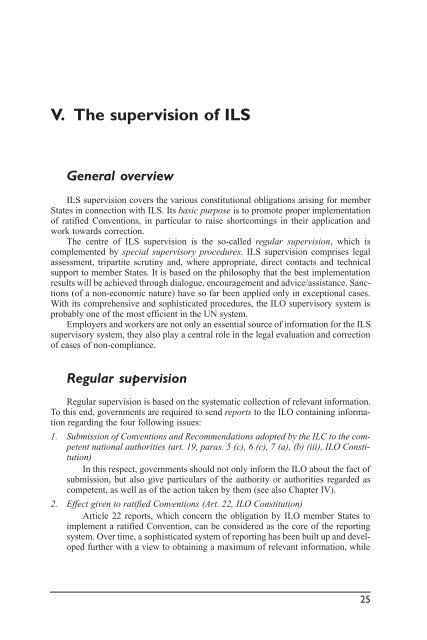Employers' Handbook on ILO Standards-related Activities
Employers' Handbook on ILO Standards-related Activities
Employers' Handbook on ILO Standards-related Activities
Create successful ePaper yourself
Turn your PDF publications into a flip-book with our unique Google optimized e-Paper software.
V. The supervisi<strong>on</strong> of ILS<br />
General overview<br />
ILS supervisi<strong>on</strong> covers the various c<strong>on</strong>stituti<strong>on</strong>al obligati<strong>on</strong>s arising for member<br />
States in c<strong>on</strong>necti<strong>on</strong> with ILS. Its basic purpose is to promote proper implementati<strong>on</strong><br />
of ratified C<strong>on</strong>venti<strong>on</strong>s, in particular to raise shortcomings in their applicati<strong>on</strong> and<br />
work towards correcti<strong>on</strong>.<br />
The centre of ILS supervisi<strong>on</strong> is the so-called regular supervisi<strong>on</strong>, which is<br />
complemented by special supervisory procedures. ILS supervisi<strong>on</strong> comprises legal<br />
assessment, tripartite scrutiny and, where appropriate, direct c<strong>on</strong>tacts and technical<br />
support to member States. It is based <strong>on</strong> the philosophy that the best implementati<strong>on</strong><br />
results will be achieved through dialogue, encouragement and advice/assistance. Sancti<strong>on</strong>s<br />
(of a n<strong>on</strong>-ec<strong>on</strong>omic nature) have so far been applied <strong>on</strong>ly in excepti<strong>on</strong>al cases.<br />
With its comprehensive and sophisticated procedures, the <strong>ILO</strong> supervisory system is<br />
probably <strong>on</strong>e of the most efficient in the UN system.<br />
Employers and workers are not <strong>on</strong>ly an essential source of informati<strong>on</strong> for the ILS<br />
supervisory system, they also play a central role in the legal evaluati<strong>on</strong> and correcti<strong>on</strong><br />
of cases of n<strong>on</strong>-compliance.<br />
Regular supervisi<strong>on</strong><br />
Regular supervisi<strong>on</strong> is based <strong>on</strong> the systematic collecti<strong>on</strong> of relevant informati<strong>on</strong>.<br />
To this end, governments are required to send reports to the <strong>ILO</strong> c<strong>on</strong>taining informati<strong>on</strong><br />
regarding the four following issues:<br />
1. Submissi<strong>on</strong> of C<strong>on</strong>venti<strong>on</strong>s and Recommendati<strong>on</strong>s adopted by the ILC to the competent<br />
nati<strong>on</strong>al authorities (art. 19, paras. 5 (c), 6 (c), 7 (a), (b) (iii), <strong>ILO</strong> C<strong>on</strong>stituti<strong>on</strong>)<br />
In this respect, governments should not <strong>on</strong>ly inform the <strong>ILO</strong> about the fact of<br />
submissi<strong>on</strong>, but also give particulars of the authority or authorities regarded as<br />
competent, as well as of the acti<strong>on</strong> taken by them (see also Chapter IV).<br />
2. Effect given to ratified C<strong>on</strong>venti<strong>on</strong>s (Art. 22, <strong>ILO</strong> C<strong>on</strong>stituti<strong>on</strong>)<br />
Article 22 reports, which c<strong>on</strong>cern the obligati<strong>on</strong> by <strong>ILO</strong> member States to<br />
implement a ratified C<strong>on</strong>venti<strong>on</strong>, can be c<strong>on</strong>sidered as the core of the reporting<br />
system. Over time, a sophisticated system of reporting has been built up and developed<br />
further with a view to obtaining a maximum of relevant informati<strong>on</strong>, while<br />
25

















